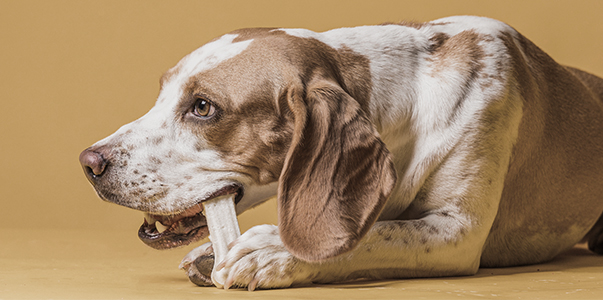Although pet treats are something fun & tasty to spoil your pet, they also play an important role in our pursuit of our pets' health and wellbeing. Why? Because they are key to training, dental care and nutrition.

In this article we’ll delve into the many benefits of pet treats, and also tackle the critical question: what makes a healthy treat? With thanks to our Absolute Pets vet, Dr Cooper for sharing her expertise with us.
Treats for training
High quality, healthy treats are considered essential by many vets and animal behaviourists. The reason is that when used as a tool to communicate with your pet and reward good behaviour, they are a super effective training aid.
Treats are used to help encourage the behaviour you are looking for. For example, you can use a treat to help your puppy learn to sit by holding it close to their nose and then moving it over the back of their head, which usually results in them raising their nose and naturally ending up in a sitting position. The key to training with treats though is to reward the behaviour you are looking for immediately, so that your pet learns the positive association at the time the behaviour is happening. Then, it takes practice and repetition.
With lots of practice eventually the link between command, action and treat will become seamless and soon the behaviour can be so natural that you won’t need to reward every action with a treat!
Top tips for training treats
- Keep treats super small (cut them down). You may end up giving quite a few treats to your pet whilst training them, so it’s important to keep them small so you don’t give them too many at once.
- Use a selection of treats to keep motivation levels high.
- If you are teaching them something new or complicated, use a ‘high-value’ treat (something they really love, their absolute favourite treat).
- Keep different treats in different compartments or bags so they don’t all smell the same.
- Be aware of treats that are too rich. Too many liver-based treats, for example, can upset the tummy.
- Many animal behaviourists will advise you to never leave the house without a bag of treats and to spend quality time each day wherever you, are training with treats.
Treats for dental care
Dental disease is one of the most common diseases diagnosed by Vets and yet dental care is so often overlooked. The sad truth is that dental disease can be absolutely devastating for pets as it is often caught too late, and once it has advanced there is little that can be done to relieve or cure it. And so, when it comes to dental care, prevention is better than cure. Read our comprehensive guide to dental care for pets here.
Top tips for dental care treats
- The goal is to prevent plaque build-up. Dental treats for cats and dogs are designed in such a way that when your pet chews on them it helps loosen and prevent plaque build-up.
- Let your pet chew on a top quality, durable rubber chew toy like a Kong, stuffed with treats.
Browse all dental treats for dogs here and
all dental treats for cats here.
Treats for nutritional health
The treats you choose to feed your pet are a fundamental part of their nutrition and also their daily calorie intake. Therefore, it’s critical that you choose healthy treats and give them in the right quantity, so that you don’t risk your pet gaining weight (an overweight pet is at a far greater risk of many more health issues).
Here are a few tips on what to look out for when choosing healthy treats:
- Stay away from refined carbohydrates.
- Avoid sugary treats.
- Choose low-fat treats to keep calorie intake low too.
- Look for high-quality protein so that you can be sure you are adding healthy amino-acids to their diet.
- Steer clear of ‘human’ food - so often the scraps we feed our pets contain too much fat, sugar and salt.
Treats you can find at home
If you are all out of store-bought treats for your pet, don’t worry. Here are a few things you might have at home that will work:
- Boiled chicken breasts, cut up into small pieces (finger-nail size).
- Carrots (again small enough so they are not a choking hazard).
- Apple and pear (without the seeds).
- Cooked eggs (in small quantities).
Recommended pet treat brands
We have a wide range of tasty pet treats for all purposes available online or in store. Recommended brands include:
You can also browse our full range of pet treats for dogs and pet treats for cats here.
Get in touch
A huge thank you to Dr Candice Cooper, our Absolute Pets' Vet for sharing her expertise with us and helping us put together this article.
And remember, we are also here to help so visit your local Absolute Pets store or get in touch with us online, or on Facebook.
Happy & Healthy
Absolute Pets